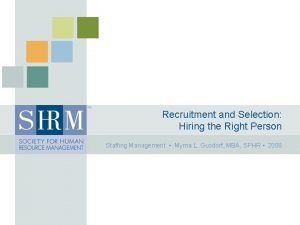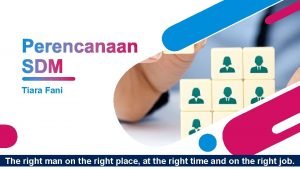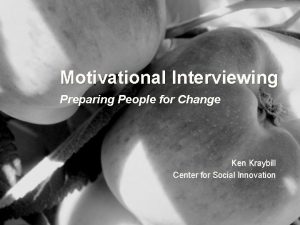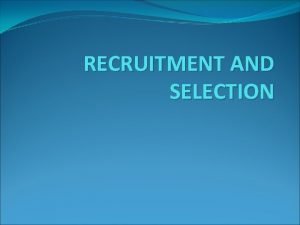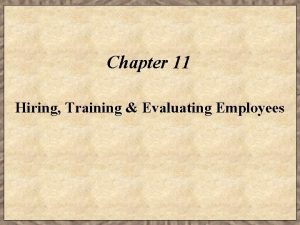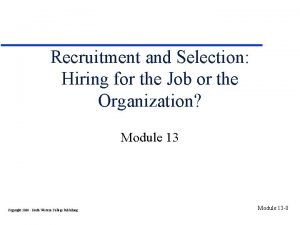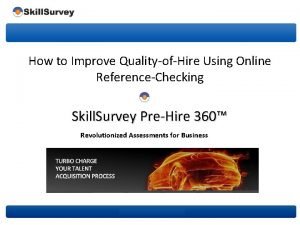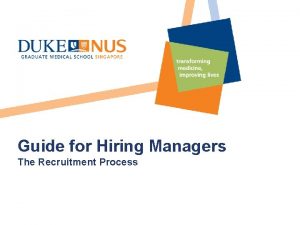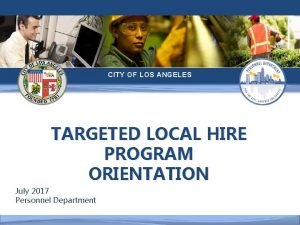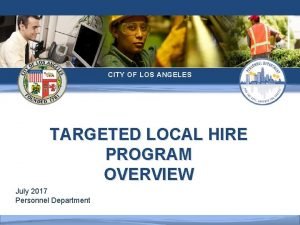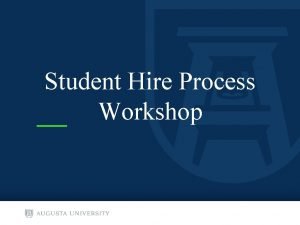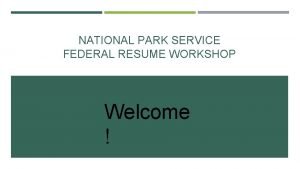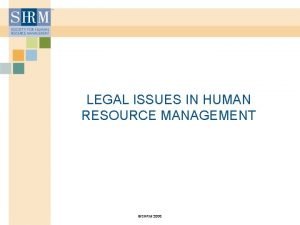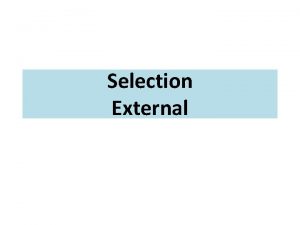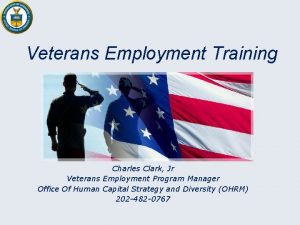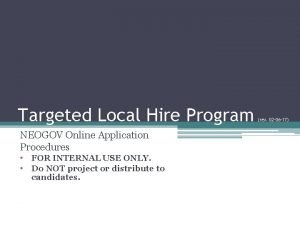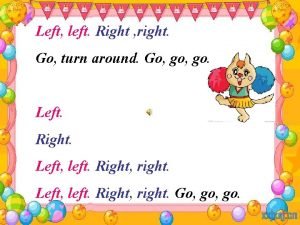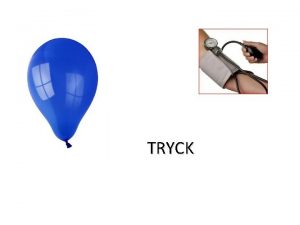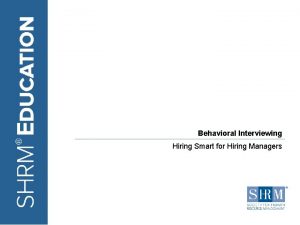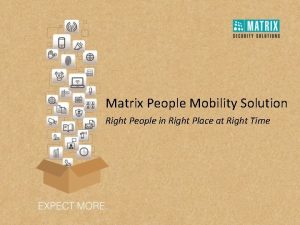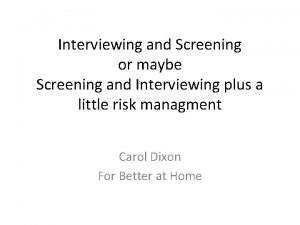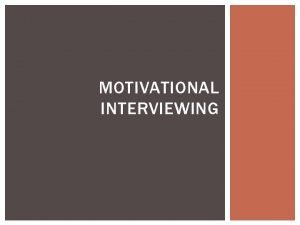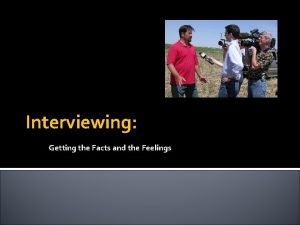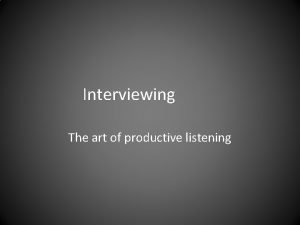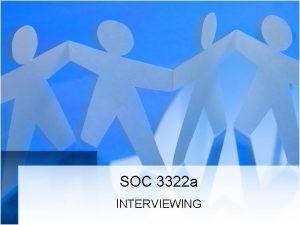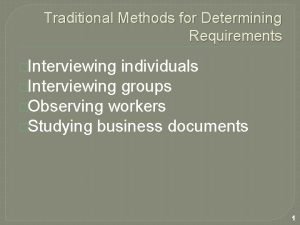Interviewing and Hiring Hiring the Right People for











































- Slides: 43

Interviewing and Hiring: Hiring the Right People for the Right Jobs at the Right Time

Who Are We? Dan Hernandez Senior Manager of Risk Control Operations 2

Let’s Get Started • • • Who has hired someone? Who has made a good hire? How did you know it? When did you know it? Who has made a bad hire? Why do good people make bad hires? How much does a bad hire cost?

Cost of a Bad Hire Direct Costs • • Salary Benefits Recruiting/posting Severance Unemployment Temp Agencies Training Potential legal fees

Cost of a Bad Hire Indirect Costs • Your time in selection process • Your time and others interviewing • Training & re-training • Loss production • Employee morale

What’s it Worth to You? Activity - Estimate the cost of a bad hire Can be up to 5 X the employees salary

Managers Have Two Choices… Hire Smart OR Manage Tough!

The Hiring Process 1. Review job description – is it accurate? • Identify success criteria 2. Post Position 3. Prepare for Interview • Questions, team and schedule 4. Screen Applicants 6. Conduct Interviews 7. Background Checks (Criminal History and MVR) 8. Employment Verifications & Reference Checks 9. Making the Offer 10. On-boarding and Training

True/False You should not disclose some of the horrible parts of the job so you don’t lose candidates.

True/False A applicant with 3 – 4 jobs in 5 years is an undesirable candidate.

True/False It is your responsibility to maintain control over the progress of the interview.

True/False When a candidate is late it disqualifies them from consideration?

True/False Best dressed candidates are more professional.

True/False It makes little difference whether or not the applicant has a favorable impression of you.

True/False You can probe for more detailed information by asking more detailed questions.

True/False Interviewing is such a simple skill that practicing and preparing is a waste of time.

Ask for HR Assistance • Conduct a thorough job analysis • Determine key job criteria • Assist with development of a job description based on the job analysis • Determine equitable salary based on job requirements • Recruitment – determine where and how to find qualified applicants • Review applications for minimum qualifications specified in job description • Refer applications to hiring authority/supervisors

Where Do I Find Candidates? Postings Referrals Personal Recruiting Other divisions? ? ? Friends and family Local Colleges Professional Associations • Your competition • • Clients/consumers • Their family members • Texas Workforce Commission • Job Fairs • Social Media • Linked. In • Staffing Agencies • Others?

Identify the Success Criteria Can they do it? Will they do it? How will they fit?

Can They Do It? • • • Knowledge Skills Ability Education License or certification Does the job description reflect this?

Will They Fit? • • Job - Skills Center - Mission Team Supervisor/manager

Will They Do It? • • • Motivation Work ethic Integrity Initiative Discipline Values

Will Do? “Hire for attitude, train for aptitude. ”

Common Desired Traits • • Honesty Integrity Ethical Trustworthy Dependable Team Player Compassionate Hard worker • • Flexible People centered Good communicator Willing to learn Self starter Organized Deadline driven Attention to detail Is this easy to discover in an interview?

Interview Questions Types of interview questions: • • Creative? Factual General Leading Hypothetical/situational Behavioral Illegal / Inappropriate (can be unintentional)

BASIC LEGAL GUIDELINES

Basic Legal Guidelines • • Questions must be clearly tied to job requirements, even just conversation. Do not consider questions with any bias for or against any protected class (race, color, sex, religion, national origin, or disability status. ) 27

Never Ask About… • Age Sex or gender • Race or ethnicity Citizenship • Ancestry, birthplace or • native language • • Arrest record • • Organization membership or other affiliations • • • Credit history or financial situation Unrelated training or education Sexual Orientation Marital status or childcare Pregnancy or medical history Physical or mental disabilities

Behavioral Questions • Basic premise – Past examples of performance are the best way to predict future performance. • Proven the most effective in determining candidate success A majority of your interview questions should be behavioral Follow up a situational with a behavioral • •

Behavioral Questions • Identify most important success criteria and ask for example stories: • • • “Describe a situation when you (used this Skill)” “Tell me about a time when you (demonstrated this Behavior)” Listen for complete stories with: • • • Situation – Who, what, when, where? What was the goal? Action – What did you actually do? What decisions did you make? Results – How successful was the outcome?

Screen Applications & Resumes • • Does HR filter for minimum education/experience? Look for green and red flags on application: • • Short stints, job-hopping, employment gaps Progression vs. Stagnation Accomplishments vs. Job Duties Other green or red flags?

Phone Screen Applicants • 10 -15 minutes can save hours onsite • Review career history, address red flags • Ensure understanding and agreement on compensation, availability, and requirements • Give a clear picture of the job • Make initial assessment of motivation, fit, communications skills

Basic Legal Guidelines • Clearly document your objective, defensible reasons for selection or rejection (but not on application). • Don’t discuss reasons for rejection with applicants. Be consistent with all candidates. •

Keys to a good interview • Prepare in advance • Use at least multiple interviewers in a panel • Make the applicant feel welcome • Avoid fumbling facts or forms • Give a realistic job preview • Clear up uncertainties

Keys to a good interview Maintain control the process Avoid too much talking Keep the interview positive Consider what you are looking for with your questions • Take appropriate notes • Avoid sensitive areas and unnecessary questions • •

Keys to a good interview • Inform them of the hiring process • Leave adequate time for applicant questions • Confer with other interviewers immediately. Discuss any differences in view and come to consensus • Do not “fall in love” with any applicants until after background checks are completed • Document recommendation and reasons

Avoiding Problem Hires • What if they are late? • What if they are over emotional? • What if they over share? • What if they complain about the supervisor? • What of complain about their job or the company?

Background Checks • Background checks are ESSENTIAL. • Do not commit to any applicant until after checks are complete. • HR checks criminal and motor vehicle records. • Managers may verify employment and references.

Reference Checks • Interview at least 3, preferably past managers. • Ask about: • Specifics of past work relationship (dates, titles, etc. ) • Compare responses to application and resume • Job duties and reason for leaving • Ask behavioral questions, not leading questions.

Reference Checks There are good ways to find red flags: • “In what ways did he/she grow when you worked together? ” • “What advice would you give him/her today? • “What advice would you give me to be most effective as his/her manager? ” • “Who else can I talk to for additional information? ”

Making the Offer • Who makes the official conditional offer of employment? • Do not make any offers, verbal or otherwise, to applicant before, during, or after the interview. • Consider hire date. Transition plan if internal.

On-Boarding and Training • How do you make new employees feel welcome? • • • Packet sent before 1 st day at work site Welcome gift or handwritten card New employee lunch Brief them on the NEO process beforehand Meet with them during the orientation training. Personally introduce to co-workers. Assign a “safe” mentor. Discuss not just immediate expectations but longer term development plans and training. Other ideas?

Thank you! Dan Hernandez dan. hernandez@yorkrisk. com
 Right product right place right time right price
Right product right place right time right price Family time
Family time Recruitment and selection: hiring the right person
Recruitment and selection: hiring the right person The right man on the right place at the right time
The right man on the right place at the right time Decisional balance
Decisional balance Differentiate between recruitment and selection
Differentiate between recruitment and selection Hiring training and evaluating employees
Hiring training and evaluating employees Differentiate between recruitment and selection.
Differentiate between recruitment and selection. Definition of people media
Definition of people media Skill survey healthcare hiring
Skill survey healthcare hiring Objectives of recruitment
Objectives of recruitment City of los angeles targeted local hire
City of los angeles targeted local hire Targeted local hire program
Targeted local hire program Geico hiring process
Geico hiring process Campus hiring
Campus hiring Public lands corps hiring authority
Public lands corps hiring authority Negligent hiring in hrm
Negligent hiring in hrm Ameren gas laborer
Ameren gas laborer Uab adminsystem
Uab adminsystem Initial assessment methods for hiring
Initial assessment methods for hiring Histology jobs
Histology jobs Schedule a hiring authority 5 cfr 213,3102(u)
Schedule a hiring authority 5 cfr 213,3102(u) Targeted local hiring program
Targeted local hiring program Where is the love 2016 lyrics
Where is the love 2016 lyrics Left left right right go turn around go go go
Left left right right go turn around go go go Put your left foot in
Put your left foot in Left left right right go go go
Left left right right go go go Fspos
Fspos Novell typiska drag
Novell typiska drag Nationell inriktning för artificiell intelligens
Nationell inriktning för artificiell intelligens Vad står k.r.å.k.a.n för
Vad står k.r.å.k.a.n för Shingelfrisyren
Shingelfrisyren En lathund för arbete med kontinuitetshantering
En lathund för arbete med kontinuitetshantering Kassaregister ideell förening
Kassaregister ideell förening Tidbok
Tidbok Anatomi organ reproduksi
Anatomi organ reproduksi Vad är densitet
Vad är densitet Datorkunskap för nybörjare
Datorkunskap för nybörjare Stig kerman
Stig kerman Mall för debattartikel
Mall för debattartikel Magnetsjukhus
Magnetsjukhus Nyckelkompetenser för livslångt lärande
Nyckelkompetenser för livslångt lärande Påbyggnader för flakfordon
Påbyggnader för flakfordon Vätsketryck formel
Vätsketryck formel


